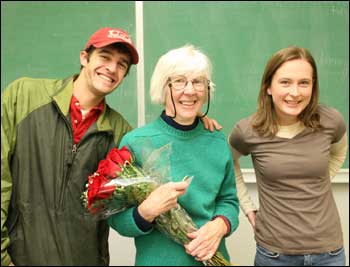This year’s Homecoming has been dedicated to Margaret Morley, associate professor of history, who is described as “sweet, funny and very dedicated to others” by the students who nominated her.
“Professor Morley is highly revered and many students comment on her devotion to students and her work here,” said elementary education major Megan Proctor, special events coordinator for ASNAU.
“She is such a genuine person who really cares about people,” said Alex Iannone, senior biology major and member of the committee that is planning homecoming. “She makes time for students, and she is so passionate about history.”
Morley learned of the honor today when several students and colleagues entered her classroom as she was grading papers to sell her a homecoming button with her picture on it—a tradition that dates back to 1936.
“This is a great honor,” Morley said. “I’ve been here for 36 years and never did I think of this. Students are why we are here and to have them honor me in this way is unexpected and unbelievable.”
Morely will be honored at the annual Homecoming Dedicatee Banquet scheduled for 6 p.m. Oct. 17 in Ashurst Auditorium. Banquet tickets are $10 and are available through ASNAU in the University Union, room 206.
NAU students select the Homecoming Dedicatee—an NAU faculty or staff member who they feel has demonstrated exceptional service to the university and interest in its students. The person selected must have been an NAU employee for ten years or more. The Homecoming Dedicatee is usually tapped a week or two prior to Homecoming and participates in major events during Homecoming week, Oct. 17-22.
In addition to teaching, Morley, who joined Northern Arizona University in 1970, was assistant chair of the history department in 1994. In 1987, Morley received the Distinguished Faculty Award from the NAU Alumni Association, and she received the NAU President’s Award in 1983.
Morley holds a B.A. from the College of Wooster, and an M.A. and Ph.D. from the University of Wisconsin at Madison. Her current research focuses on American foreign policy in the early national period and on liberals and the early Cold War.



